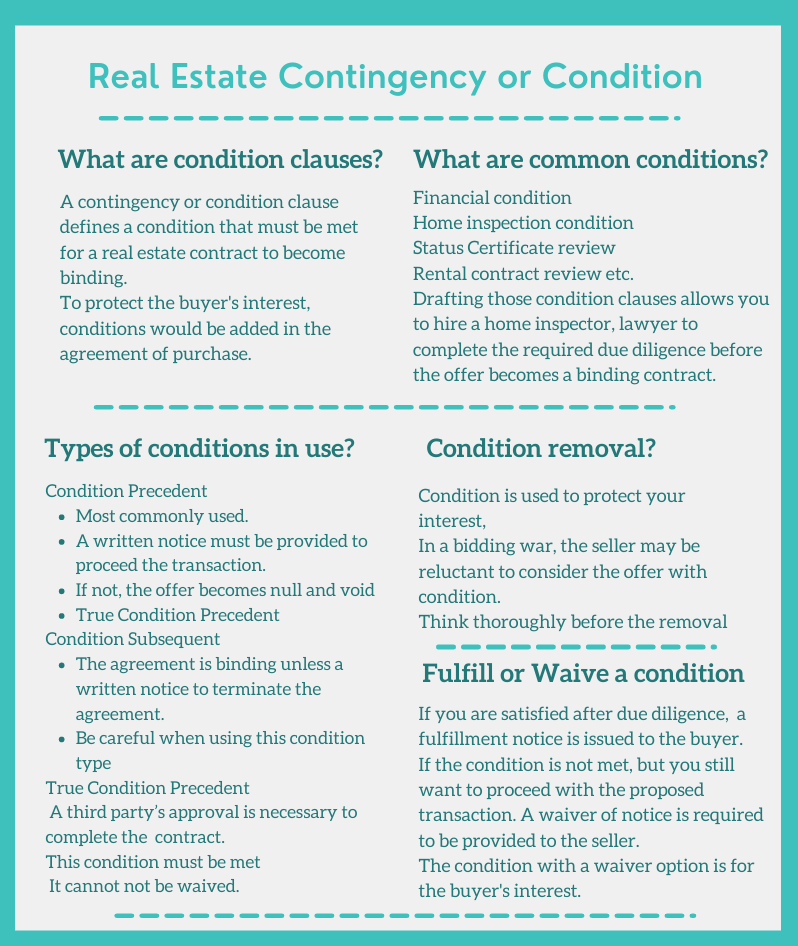- Is a commission rebate legal in Ontario? →
- How much will I actually save? →
- When do I receive my rebate? →

A real estate conditional offer is meaning a real estate contingency or condition clause is added in the agreement of purchase of sale. This clause defines that a specific condition must be met for the contract to become binding. Contrary to a conditional offer, a firm offer on a house has no such pending sale conditions.
To protect your interest, you can include conditions in the promise to purchase. Common conditions include obtaining financing and home inspection conditions.
These conditions allow you to hire a professional to do the due diligence before the offer becomes a binding contract. In the case of a condo purchase, the review of the Status Certificate is a leading practice.
A financing condition allows the buyer to confirm with the lender on the loan. It is a clause in your offer that gives you a period of time to confirm that you are able to get mortgage approval for the home you want to buy.
This condition allows you to walk away from the offer, with no penalties, if your financing is denied or the financing terms are not satisfactory to you.
Condition – Arranging a New Mortgage Concise: This Offer is conditional upon the Buyer arranging, at the Buyer’s own expense, a new _______________ Charge/Mortgage satisfactory to the Buyer in the Buyer’s sole and absolute discretion. Unless the Buyer gives notice in writing delivered to the Seller personally or in accordance with any other provisions for the delivery of the notice in this Agreement of Purchase and Sale or any Schedule thereto not later than _____ p.m. on the _____ day of __________, 20_____, that this condition is fulfilled, this Offer shall be null and void and the deposit shall be returned to the Buyer in full without deduction. This condition is included for the benefit of the Buyer and may be waived at the Buyer’s sole option by notice in writing to the Seller as aforesaid within the time period stated herein.
An event or action that is required before the agreement becomes binding on both parties. More specifically
A written notice must be provided to the seller within the time period specified in the condition so that the transaction can proceed.
The agreement becomes binding when the notice is provided as either fulfilled or waived.
If the notice is not provided, the offer becomes null and void
It is most commonly used
In certain instances, a condition requires a third party’s approval, and the contract cannot be completed without fulfillment of the condition. This type of condition is called a true condition precedent. This condition must be met; it can not be waived.
If the condition is met, a written notice (Orea Form 123) is required to be provided to the seller within the time period specified in the condition so that the transaction can proceed.
If the condition is not met, but you still want to proceed with the proposed transaction. A waiver of notice (Orea Form 124) is required to be provided to the seller. The condition with a waiver option is for the buyer's interest.
If the condition is not satisfied with you, depending on how the condition is structured in the offer, you are about to walk away from the deal. Then, the contract becomes null and void. However, you would follow the protocols to get your deposit back.
If home sellers have not put any condition when accepting the offer, the sellers are bound to the contract, and they can’t back out of it.
Condition is used to protect your interest, which normally should be included in the agreement. However, during the bidding war with multiple offers, the seller may be reluctant to consider the offer with a condition.
What might be your choice? Please refer to How to win a bidding war among multiple offers